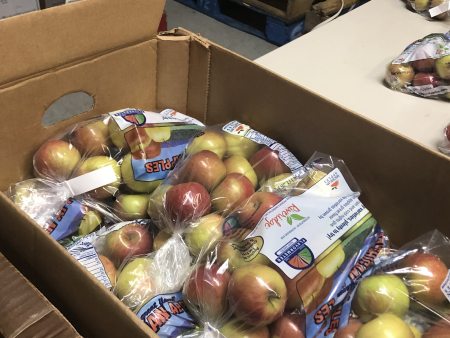Battling Food Insecurity in Mount Pleasant: Why It Matters
- Loreal Nix

- Dec 11, 2018
- 6 min read

Canned goods sit on the shelves of the openly new Compassion Community Network food pantry in the Stickler Center on 1114 W High Street Photo by Loreal Nix
Food insecurity —the lack of reliable access to a sufficient quality of affordable, nutritious food — is widespread among the country.
Families and even students have to struggle to find out where their next meal will come from every day, and as a result, this affects a person’s livelihood, education, and even development.
According to FeedingAmerica.org, 1,414,700 people in Michigan are struggling with hunger; 365,930 are children.

Source: feedingamerica.org
In Isabella County, where Mount Pleasant is the county seat, 12,060 people— 17% of the population struggle with food insecurity. Based on the chart below, even though the food insecurity rate has gone down over the past year, around 12,000 people are struggling with food insecurity, which is a chunk of the 71,063 people living in Isabella County. The Mount Pleasant population is about 1/3 of that— 25,847, so imagine the number of people that are struggling with food insecurity within that area.

Source: http://www.countyhealthrankings.org
Food insecurity is quite inconspicuous: almost anyone of any race, gender, age, and background can be affected by food insecurity once in their lifetime. There are many contributing factors to food insecurity. According to Delicious Living, food deserts are the main cause of food insecurity. Food deserts are low-income areas that are more than one mile from a supermarket or large grocery store (or 10 miles in rural areas), severely limiting access to fresh food. Insufficient income is also the leading cause of food insecurity, preventing families from accessing enough food and healthy food.
As a result, a vicious cycle of food insecurity and chronic disease begins. This makes disease management more challenging. Furthermore, the time and money needed to respond to health crises drain the household budget, leaving little to no money left for nutrition. Many households have to make difficult choices between food and utilities, medical care, and even transportation.

Source: http://www.hungerandhealth.feedingamerica.org
One group of people who have to make some of those tough decisions are college students. Some college students go to class hungry, distracted from their studies by worrying where their next meal might come from. According to a study by CMU’s Office of Student Affairs, 30% of students said they experienced food insecurity, mainly due to a lack of money.
“A lot of student expenses goes towards tuition, so students are literally making a decision of whether to skip a meal or not because they simply can’t afford it and that’s a problem,” says Dexter graduate student Kourtney Koch, the graduate assistant for the first ever CMU Food Pantry.
College students have a lot to pay for. Tuition, textbooks, school supplies, housing, transportation — the list goes on and on, and sometimes being able to afford nutritious food is a real challenge for students. With higher tuition rates, the implementation of a $225-semester fee and other rising costs, this puts students in a tough position of having money to attend school but having fewer dollars to live on while in school.
CMU faculty, students and the Student Government Association helped put together a Student Food Pantry that will help students stay focused and well-fed with distributions of free food.
The pantry is located in the lower level of Robinson Hall near the North Campus Success Center and Computer-Based Testing Center. It is run by the Mary Ellen Brandell Volunteer Center. Any current CMU student can register online to receive food assistance. The pantry will distribute food once in December on Tuesday, Dec 11th from 6-8 p.m. After that distributions will be held every other Tuesday beginning in the spring semester at the same time. If interested, students can register to volunteer via OrgSync.
Food items were packed and ready to be distributed in CMU’s student food pantry on Nov. 27 near Robinson Hall.
According to Koch, The pantry is funded by private donors, alumni, and corporate sponsors. The pantry was funded at least $53,000 to work with at the start and has overall raised $29,955 worth of donations, exceeding their goal of $25,000.

In the past, Koch has volunteered for other pantries like the Community Compassion Network. She is excited about the progress the CMU pantry has made so far and is optimistic that it will be the right step in combating food insecurity.
“I’m very much motivated to help students in the community who need the assistance,” she said. “It’s important that these students have a resource like this because they shouldn’t have to face going through hard times to get basic necessities. The foundation of this pantry and the help and support of students, faculty, and staff will go a long way to tackle food insecurity.”
Detroit sophomore Claire Smith was one of the students who registered for the food pantry.
Food items were packed and ready to be distributed in CMU's student food pantry on Nov. 27 near Robinson Hall.
Smith said that losing her scholarship on top of higher tuition rates caused her to make dramatic lifestyle changes.
“My mom worked her butt off to get me to school with all she has, so it caused me to literally decide between paying my tuition & rent payments on time and buying food,” Smith said. “I’m so grateful for the food pantry to be on campus and the amazing staff that is going out of their way to make sure I’m well-fed, I couldn’t thank them enough.”
Smith admits that it was hard for her to reveal to her friends about her struggles with food insecurity or asking for help because she didn’t think she could find any help.
“Food insecurity is very invisible on campus. You can’t really tell by looking at someone if they’re constantly worrying about where their next meal will come from,” Smith said. “When I walked in the food pantry, I received nothing but smiles and kindness. That definitely gave me a great sense of security, that CMU generously cares for their students.”
Click below to hear students’ experiences and perspectives with food insecurity:
In addition to the CMU Food Pantry, there are at least 4 certified food pantries across Mount Pleasant that works with families and students in the community in need of proper nutrition:
Salvation Army: Open Mon-Fri: 10-noon & 1-3
Winn Methodist Church: Gives away food once a month
Potter’s House: Open 3rd Thursday of the month
Isabella County Soup Kitchen: Open Mon-Sat: 8 a.m.- 1 p.m.
One, in particular, Community Compassion Network, works diligently with families and students to give ample amounts of food to them. The pantry, located at 1114 W. High St. in Mt. Pleasant, opened in January of this year. Hours of operation for the pantry are Wednesdays from 2 to 6 p.m., Thursdays from 8 a.m. to 1 p.m., and every 2nd and 4th Saturday from 9 a.m. to noon.
Residents can either call for an appointment or walk-in for assistance. Pantry workers have visitors sign in, as they walk with them and help them select food.
According to Deb Skinner, Community Compassion Network Secretary, families can sign a sheet indicating how many children and adults are in their household and their income. That sheet determines the quantity of food they are allowed to take. All of Community Compassion Network’s food items are distributed from the Greater Lansing Food Bank.
Within just 10 months of being in business, Community Compassion Network has helped over 22,436 people and has given away over 454,000 pounds of food. Skinner, a retired bookkeeper who has worked for the pantry for over 2 years was shocked by how much progress the pantry has made.

“We take these citizens words that they need help, and provide all that we can to provide them with nutritious, healthy food to nourish their bodies,” Skinner said. “It truly means a lot to our staff and volunteers that every person that walks through our door will be serviced to the highest degree. It’s a wonderful feeling to know that there are so many generous people in the community, and it makes every day at the pantry a good day.”

Volunteers at Compassion Community Network move boxes of food ready to be stacked on shelves on Dec. 5 Photo by Loreal Nix
John Bugh, a citizen of Mount Pleasant and an Army veteran is one of the many people getting food at the new pantry.
Lately, it has been hard for Bugh to get back on his feet financially, as unexpected medical scares have drained his income, leaving him with little money for healthy food.
“Due to my low levels of iron, my doctor recommended me to eat certain foods like spinach and broccoli to help increase my iron absorption,” Bugh said. “However, it was a hassle getting access to affordable daily produce and other foods that I needed.”
“Thankfully, the food pantry has made getting food a lot more convenient. Their warehouse is stuffed with fresh produce and grains that make it easier to have a balanced diet. I’m forever grateful for the food pantry.”
Food insecurity is an issue that affects all of us citizens, believe it or not; however, it is an obstacle that we can overcome together. Volunteer at your local food pantry whenever you have the time and donate food to local pantries. Contact your state’s legislators and urge them to support hunger relief efforts. Most importantly, openly have the talk about food insecurity with your professors, family, friends and school staff. Educating yourself on food insecurity and what you can do to help is the right way to tackle food insecurity.

















Comments